#tragedy of the commodity
Text
The tragedy-of-the-commodity logic is built on political-economic theorizing that recognizes that elite capitalists, most notably, corporations, have the power to create and manipulate markets rather than simply respond to preexisting demand. Although people have some enduring demand for resources to meet their basic needs, such as for food and water, the vast majority of consumption in modern economies is not to meet basic needs. Before the modern era, there was typically no perception of need for most of the commodities that industrial capitalism would later provide. In fact the insatiable consumer desire that is taken for granted in capitalist societies was not even conceived of before consumerism as a way of life was constructed over the past two centuries by the concerted efforts of private industry. Recognizing this helps to make sense of why petroleum and other fossil fuels did not lead to an end to whaling. If demand for a commodity, like whale oil, was limited by need, then a potential substitute, like petroleum, could reasonably be expected to push it out of the market. However, demand for resources is not fixed at a “natural” level. Rather, demand can expand as established uses increase in frequency, such as using abundant oil of various types to have more lighting, and as innovation leads to new uses for resources, such as how whale oil came to be used for margarine, in paint, and so forth. In pursuit of profits, capital clearly has it in its interest to work to continually expand consumption and develop new products for sale. Therefore, increasing the supply of new resources, like fossil fuels, does not necessarily displace consumption of other resources. New resources can be added to, rather than used in place of, others in the market as new ways are found to make commodities (and profits) from all available resources.
Richard York, Why Petroleum Did Not Save the Whales
252 notes
·
View notes
Text
(minors / blank / ageless blogs dni)
their past relationships, and how it hurt them:
gojo - was used for his status, his money, his power. he’s a pretty trinket to wave around, a commodity. objectified by his past lover, who he showered with love hoping for an ounce of return but never received it. he was begging for love, hoping it would come but it never did. he had to walk away - he was losing his mind. it was the only time he saw his lover fight for him. plead and cry for him. tell him they loved him. but he knew it wasn’t for him. it was because of everything else they would lose in the process.
geto - saw how they fell out of love with him. when his walls crumbled down and they finally felt the cracks on this romantic’s heart. he told himself being vulnerable would make the relationship stronger, but instead he saw the warmth leave their eyes. he’s irreparable, he thinks. too damaged for anything true. he showed no emotion when they said that he was complicated, when they didn’t have the patience to understand him wholeheartedly. after that, he swore he would never reveal his weaknesses again. he would never be naive with his love - and so he’ll keep it to himself.
nanami & higuruma - knows that their commitment is their love. that’s what they believed and because of their devotion, they trusted too blindly. when their lover betrayed them by carrying on an affair so deep into their relationship (by then they were either engaged or married) they were completely taken aback; shocked, and panicked over what they possibly could have done wrong. they were told that they were too cold, and too analytical in a relationship. that there was no passion or fire. they never saw themselves as rigid, never considered that their genuine love would be the reason why everything fell apart.
choso - he knew it wasn’t working; his former lover was different and he couldn’t fit in their world no matter how he tried. he was the thrill, the escape, the outlet that they needed for a taste of danger. choso simply couldn’t handle the thought of walking away. they claimed they loved him but he’s never felt more alone and would rather this than the latter. his brothers would tell him it shouldn’t be this complicated, and he struggled coming to terms with that. walking away was heartbreaking, and he was left wondering if he might ever experience something real with somebody who mattered.
toji - had love, which makes it so painful. the feeling coexisted with his every need, like the air he breathes and the water he drinks. she was his everything, his world, and his happiness. tragedy tore them apart, an illness that neither of them could see. he fought against the fates, screamed at the heavens above for trying to steal what rightfully belonged to him. and in the end, he lost the battle. he was left with only grief and memories. a broken heart that would never heal the same again.
sukuna - was told he was hard to love. he never claimed to be a saint but he didn’t consider himself a brute or a beast either. navigating romance wasn’t his strong suit, but it’s not like he wasn’t willing to put in the effort. that he wasn’t willing to try. however, nothing was ever enough. nothing he ever did seemed to work. every attempt blew up in his face, so he eventually just stopped trying. what was the point anyway, if he was difficult to love? he might as well stop pretending like he deserves it.
#jjk hcs#jujutsu kaisen headcanons#Gojo x reader#gojo headcanons#geto x reader#geto headcanons#nanami x reader#nanami headcanons#higuruma x reader#higuruma headcanons#choso x reader#choso headcanons#toji x reader#toji headcanons#sukuna x reader#sukuna headcanons#jjk angst
490 notes
·
View notes
Text
You're Mine No Matter What: The Commodification of Sand
I have been thinking a lot in the last couple weeks about the dynamic between Ray and Sand, namely the significant imbalance between Sand and Ray in their relationship to one another that has been at the very least, fun to watch, even as I have been slightly miffed at Sand being so much of a simp for Ray when Ray does not reciprocate these feelings.
Now, @emotionallychargedtowel had a brilliant write up about Sand’s possible parentification and resulting need to play the caretaker for the people around him, which everyone should read. I loved it a lot because it puts Sand in to perspective, that he can be jerked around and insulted and still have care and still want to help the person who is actively and intentionally trying to insult him. Sand likes Ray, that much has been clear from the moment Ray rested his head on Sand’s shoulder after puking in Episode 1, but Ray? Ray does not see Sand the same way, as much as his puppy dog eyes may lead Sand to believe.
To Ray, who is rich, and difficult to manage, and holds on so tightly to the belief he is a burden, Sand is a commodity, something Ray owns. And it is absolutely hilarious to me that I was thinking about trying to do this write up and drop it before Episode 8, and decided I should wait. AND I AM SO GLAD I DID BECAUSE RAY LITERALLY SAID AS MUCH TO SAND THIS EPISODE.
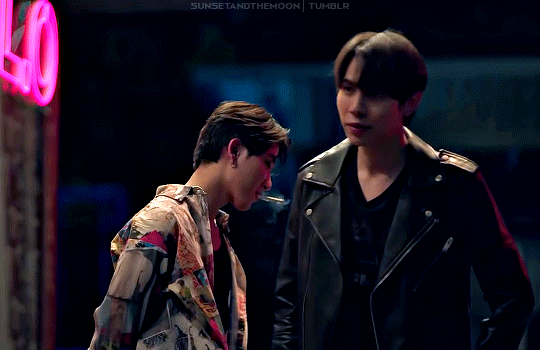
Listen, I love First and I love Khao and I love FirstKhao’s chemistry, but in no way, shape, or form do I want Ray and Sand to end up together, they are terrible for each other, and Sand’s lack of self respect at this point is a motherfucking tragedy. I mean, think about it, what care has Ray given to Sand?
Drove Sand to his apartment after the party (and then ditched him in the middle of a make out)
Offered to buy him a guitar
What care has Sand given to Ray?
Driven him home and taken care of him when he was blackout drunk
Hung out with him when no one else was around to care: Paid
Hung out with him when no one else was around to care: For Free
Cooked food for Ray
Changed his work schedule to play at the hostel party
Cooked breakfast for Ray
Let Ray use him as an excuse to not go to work and instead spending the day with him on Sand’s birthday
Helped Ray change his clothes
Followed after Ray and tried to stop him from drunk driving after Ray called him a whore
Saved Ray from his car accident
(Most likely) agreed to something from Ray’s dad
Took care of Ray when he was injured including helping him shave and bathe.
Tried to save Ray from getting caught with drugs by the cops after Ray interrupted his time with another guy and kissed him without consent
Tried to fight the cops to get them to let Ray go after Ray essentially said that he owned Sand.
Sand is poor, he’s booked and busy, he’s barely got time of his own to spend on the things he enjoys, he is fundamentally a caretaker, juggling school, multiple jobs, and his mother’s health. We see how much of grind Sand’s life is in the montage at the beginning of Episode 5, he does not have room to slip another person in to his life, hell, the boy barely has any friends. He’s never hanging out with anyone unless it’s Nick and he’s at home. So it is very important to keep in mind that Sand is making time for Ray. Sand has a life that is jam packed and stressful, and Ray keeps asking for more and more of Sand’s time. Time Sand cannot really afford to give and gives it anyway.
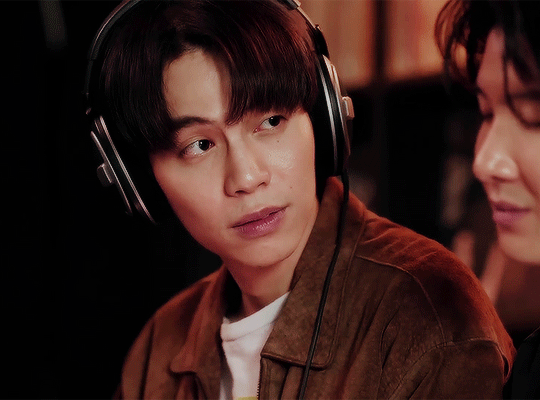
Sand is a caretaker, Sand has a crush on Ray, Sand cannot say no to Ray’s puppy dog eyes and chronic need for help. And the tragedy here is that there is a world where I can see how Sand convinced himself that he and Ray were maybe moving in the same direction. Because Ray couldn’t let go. They fucked once, and Sand said that Ray was going to keep wanting him, and he was right. From the very beginning of their relationship to one another, Ray has been the one constantly asking for and initiating physical intimacy with Sand. The first time we see Sand initiate anything really isn’t until Episode 5 when he goes slack jawed looking at Ray before they kiss and even then Ray is the one that leans in to meet him. Ray is the pursuer here, Ray is the one that stalks Sand, Ray is the one that interrupts Sand’s next one night stand, Ray is the one that is always asking if he can stay over, that is asking for help, that is asking for sex. So of course Sand is going to start thinking some type of way about what he and Ray are to each other, even if they haven’t had any conversations about the nature of their relationship.
But I think Sand is so used to taking care of other people that he hasn’t really gotten it through his head that Ray doesn’t not feel the same. We see every twist of the knife in Sand’s face in Episode 5 whenever he is reminded of that fact. But I think that despite the shit that Ray has put him through, Sand hasn’t fully realized, or at least, he is refusing to admit it to himself that there is no scenario where Ray falls in love with him, because to Ray, Sand is a commodity.
Sand is something to be bought.
Sand is someone Ray can go to when he wants to be serviced.
Sand is his favorite toy.
Ray doesn’t like Sand, Ray likes the attention, Ray likes being noticed, Ray likes being cared for, because in his life, his friends mostly ignore him, his father mostly ignores him, his mother is dead and he grew up knowing that she hated him. Ray fell in love with Mew because Mew gave him attention and care, because Ray held him in the bathtub while he sobbed, and Ray has never been able to let go of that idea. But so too, has Ray not been able to let go of the other person who is providing happiness on tap.
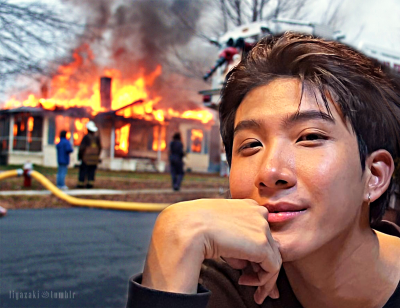
favorite photo ever, courtesy of @liyazaki
There are two critical details to remember about Ray. One- Ray is rich, Two- Ray has substance use disorder. Which means that Ray is constantly looking for the next thing that will make him feel good. He drinks to forget, he does cocaine, Ray by nature of his substance dependency does not have a concept of delayed gratification. Ray is extremely rooted in the present, in whatever dopamine hit is within the closest reach. And Sand and his natural tendency to give everything he has is one of the easiest things for him to reach for. Every time that Sand has tried to set a boundary, Ray has crossed it because he knows Sand has feelings for him, he knows he can manipulate that if he just begs cute enough. When he wants sex, he can get sex, when he wants adventure, he can get adventure, when he wants care, he can get care quick, easy, and cheap. Ray paid Sand once for his time, and learned he could be bought, and he has held on to that one time subscription fee extremely tightly.
When it comes to Ray and Sand, there is no winning for Sand that is not defined by the two of them never seeing each other again. Because the second that Ray paid Sand for his time, Sand became Ray’s property, and Ray has never stopped thinking of Sand as such. And we know this is true because of everything Ray does and says related to Sand showing any level of autonomy that runs counter to Ray’s vested interests.
Ray pays for Sand to hang out with him, and soon afterwards, Sand tries to bring a girl home from the bar for a one night stand, only for Ray to interrupt them. Sand ends up going home with Ray instead. Ray convinces Sand to keep making out with him in the car, and then casts Sand aside the second that Mew calls. Sand tries to put up a barrier and Ray is like “yeah sure I’ll care about your feelings, why don’t I buy you a guitar?” because Ray is rich, and so his first solution to conflict is to throw money at the problem, but Sand is easily sated by a little bit of crossed thumbs.
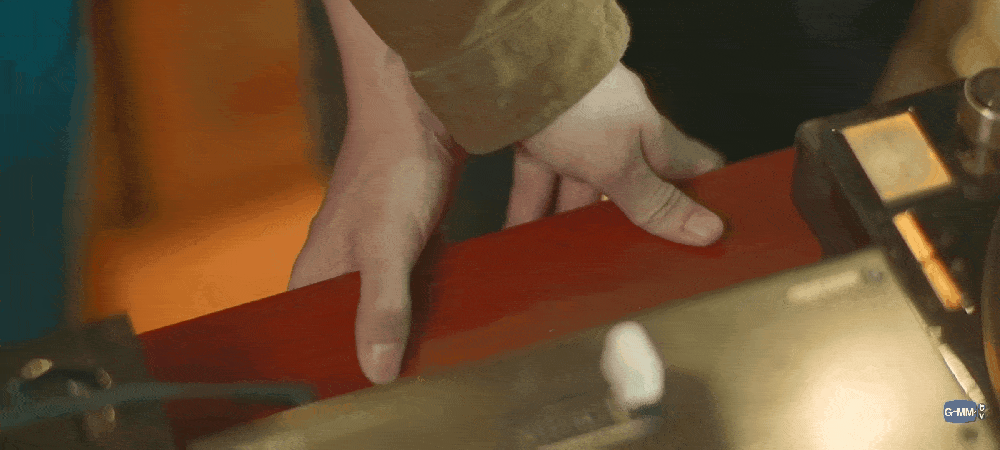
Sand tries to set another boundary in Episode 6 after he learns that Ray has a crush on Mew, and Ray blows right through that boundary by as @emotionallychargedtowel calls it, “aggressively falling apart”. Ray, to be fair to him is not getting drunk and falling to pieces to intentionally rope Sand back in to his gravity, but Sand’s long held tendencies to help people are going to send him back to Ray every time, because Ray is desperately in need of help and no one else can really be fucked.
If we weren’t already aware of Ray’s tendency to think of Sand as property, we get another great indication of Ray’s mentality around Sand in the same episode. When Ray is going off on everyone at the bar on Mew’s birthday, Sand tries to step in to stop Ray’s escalation. Ray does not take kindly to this, and says to Sand’s face, in public “You don’t wanna be a singer. You just want to make money. If you want it so much, why don’t you sleep with me?” thus associating Sand’s moments of physical intimacy and sex with Ray as purchasable, as commodities. Why? Because Sand could be bought once, and thus can be bought again. Ray doesn’t think about Sand as a suitor, he thinks of Sand as a whore, and again he says as much when Sand runs after Ray to try to stop him from drunk driving.
Sand: “Stop thinking about Mew and focus on me for once. Can’t you really see that I care about you?”
Ray: “Why would you poke your nose in my business? What are we to each other? What are we?”
Sand: “Right. We are nothing to each other, but at least I am your fellow human. I don’t want you to drive when drunk. You can risk your life all you want. But don’t you dare risk other people’s lives too.”
Ray: “Let go of me you shit. Let go. Or I need to pay you, whore?”
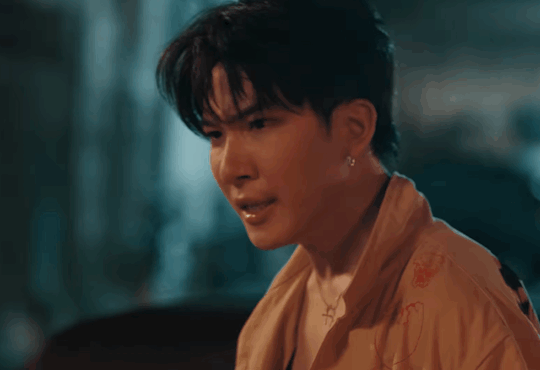
And thus we have our answer to Ray’s initial question, “What are we to each other?” “whore”. When Ray is wasted, and pissed, and Sand is showing active defiance over Ray’s behavior, Ray reverts immediately back in to the mindset that Sand is owned, that his behavior, his choices, his morals can be changed if enough money is handed to him. Because Ray has bought Sand before, because Sand is poor, and Ray is rich, and Ray thinks that the only thing that Sand could possibly want is more money.
Sand will commit crimes for money (making and selling plum wine). Sand will hang out with Ray for money. Sand will sing for money. Ray comes from a world with money, it is not absent struggle, but Ray’s struggles are more internal, engrained in his family dynamics. He has never had to worry about making enough money for rent, he has never had to worry about violence being done to him or a loved one from debtors when they can’t pay their interest on time, Ray has never had to live in a world without money, and it is clear from the first episode that Ray is someone that looks down on poor people, the way he immediately accuses Sand of stealing from him when he wakes up in Sand’s apartment.
And again, to be fair to Ray, he is not the only one. A couple of the other rich boys look down on Sand the same way. Mew wants Ray to lower his standards and settle for Sand, as if a relationship with Sand would somehow be lesser, when Sand is a good person who cares about and takes good care of Ray, he’s just poor. Top, similar looks down on Sand, he stole his boyfriend, he thinks absolutely nothing of Sand.
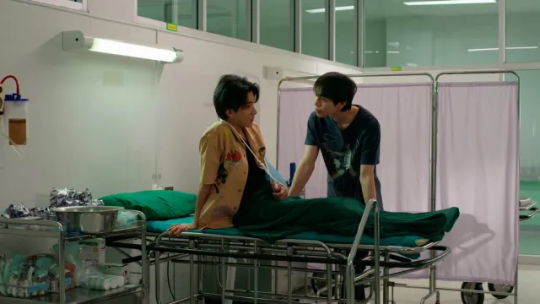
Ray gets in a car accident, Sand saves his life, and then Ray’s expectation from there is that Sand will take care of him. Sand (who has very limited funds compared to Ray) buys him a drink, he helps him strip, he helps him shave, he waits hand and foot on Ray. And how does Ray repay him? By jumping in to a relationship with Mew the very second an opportunity presents itself, leaving Sand once again in the dust. Because Ray doesn’t ever actually take Sand’s feelings in to consideration when he is making decisions. Sand is a plaything to Ray, and Ray has a shinier new offer dangling in front of him.
Sand, once again, tries to set a boundary, establish a barrier, remind himself and remind Ray that they aren’t friends, they haven’t been friends, and Sand is trying to be the bigger, better person by letting Ray go, by telling him he is happy for Ray to have finally gotten what he wanted in his relationship with Mew. And throughout the entire exchange, Ray keeps looking so confused when he hears Sand’s consistent rejection of Ray’s wishes about how he and Sand will move forward in their relationship to one another now that Ray is dating Mew.
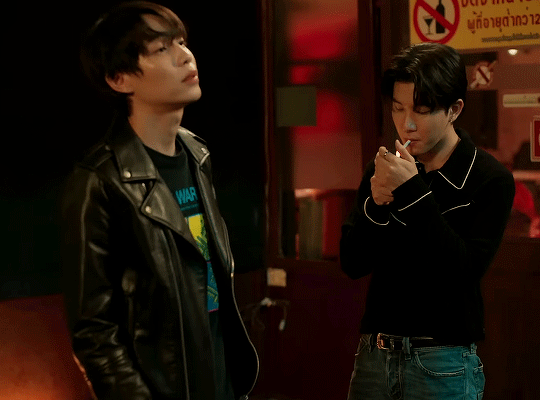
“So what’s up with Mew? I heard he broke up with Top” Sand asks, and Ray swallows hard, in a way that I personally read as guilty.
“Good, you can finally end the secret crush. Such a waste of time, right?” a confession from Sand that Ray picks up on.
“Are you okay?” Ray asks, this is the second time that Ray has tried to check in on Sand after his relationship to Mew got in the way of his relationship to Sand.
“Why wouldn’t I be? You’re seeing someone you always loved. It’s a dream come true.” Sand once again is not acknowledging out loud or honestly his own feelings, but he is putting his own feelings aside to acknowledge Ray’s feelings. To try to, even still, even after how shittily Ray has treated him, even after how much Ray has taken Sand’s care for granted, spare Ray from feeling bad about fucking with his feelings.
“Can we still be friends?” Ray asks, because he hasn’t ever had actual consequences for his behavior before.
“Friends? You and I have never been friends from the get-go. We have nothing in common. Besides, I don’t know why I should be friends with you.” Sand replies, again trying to create a barrier between him and Ray that allows him to be free from Ray’s gravity.
“But, when I’m with you, I’m so damn happy.” Ray says, because shit like that has always worked with Sand in the past: “Can we hang out together?”, “jerking off feels so good when you’re hungover”, “can you help me?”, and for the first time it really seems like Sand is sticking to his guns.
*deep breath from Sand, who seems like he is fighting back tears he is so upset at hearing that Ray is happy with him and yet having Ray deny that in favor of chasing his next piece of ass* “You will be too when you spend time with Mew. What you did with me, you will get to do it with him. You might even be happier.”
Sand tries to walk away and Ray grabs him by the arm, because Ray has never once let Sand maintain a boundary, “Sand.”
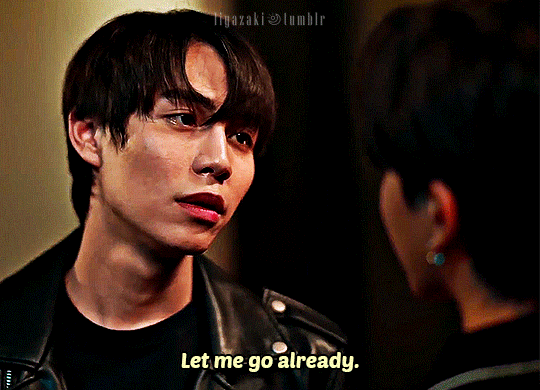
gif from @liyazaki
“Let me go already.” Sand replies, and Sand here is begging Ray not only to literally let him go, but metaphorically, emotionally, to free Sand of this back and forth. To release him from this existence as someone to be jerked around, whose feelings can be trifled with because Ray isn’t fully capable of seeing Sand as a person with his own feelings that are impacted by the choices that Ray makes.
And because Ray cannot let it go, cannot just let his precious toys leave him, he remains adamant about blowing past barriers as often as possible when it comes to his interactions with Sand. Sand literally asks Ray to let him go, and not long after that Ray is wandering back in to the study room where Sand is, trying to get them back on good terms. But again, to point out that Ray commodifies Sand, what is it that Ray is asks him for? Is it to go out to dinner with him? Is it to just hang out and chill? To go to the bar? Is it to apologize for his behavior?
No.
Ray asks Sand to come with him to do social work, to come with him to play music for children. Why? Because Sand knows how to play guitar, and Ray knows that he can wear Sand down eventually. But it bears reminding that Ray’s social work is court ordered, he is literally asking Sand to suffer the (very minimal) consequences of Ray’s drunk driving with him, and he’s trying to pick the social work option that is the least miserable, the least amount of work, and he is trying to rope in the only person he knows who can get him out of the types of social work that involve manual labor. Because Ray cannot play an instrument, so he would not be able to play music for children without Sand’s presence.
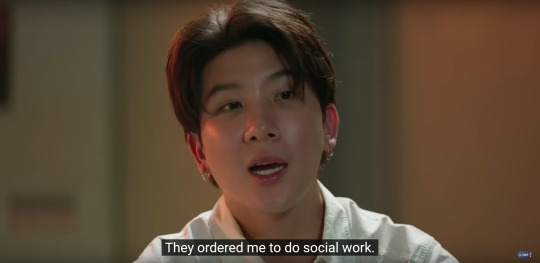
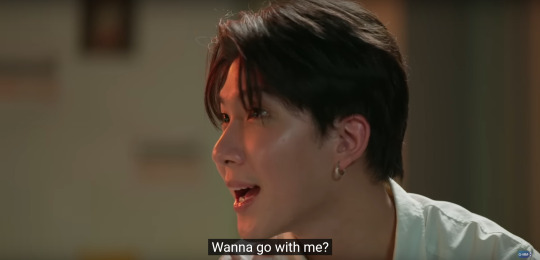
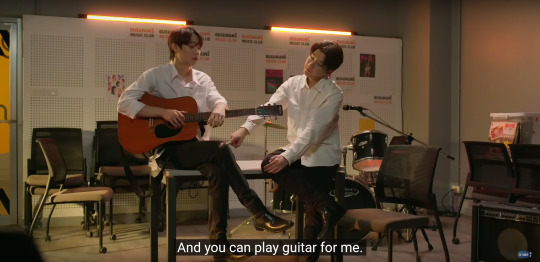
Once again, Ray proves that he is not capable of associating Sand with anything other than a service provider.
Or, as we see later on in the episode, as property.
Because here Ray is, fucking with Sand’s feelings, dating Mew, making out with Mew at the party and there Sand is, not wanting to be at this party in the least but going anyway because he feels bad about what he did to Nick by stealing and sharing that TopBoston audio file, trying to move on, trying to kiss a random stranger with mutual interests at this party, only to have…
Ray interrupt them before they can kiss, squeeze himself physically in between Sand and Freddie #2, and asking if the two of them have slept together.
“Did you sleep with him?”
“Damn it, Ray. Are you high? How about you go to sleep?”
“I want to sleep with you. Or what, should we invite Mr. Freddie here to sleep with us? Let’s do it, I’ll go first,”
AND THEN RAY GRABS SAND AND KISSES HIM WITHOUT HIS CONSENT (which I am pretty certain Mew would consider cheating especially after the whole ordeal with Top) when Sand was just about to consensually kiss someone who wasn’t Ray (again, Ray is unable to let Sand ever exhibit his own autonomy). Until Freddie #2 leaves them alone, assuming they are in a relationship, and not wanting to get involved with “someone else’s boyfriend”
“What the fuck is this. You have Mew now. What do you want from me? Go guard your boyfriend,”
“I can have feelings for as many people as I want,”
“But you can’t do this to me,”
“Stop fooling yourself, Sand. You like me,” Ray points “You love me. You can’t walk away from me. You’re mine no matter what.”
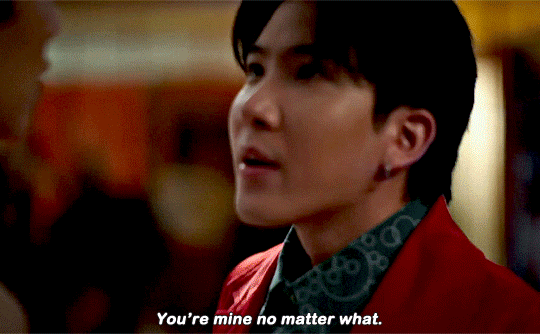
gif by @moonkhao
and there is a reason why they put Ray in the fucking Joker’s costume for this episode, cause that boy is acting toxic as all hell. So even now, Ray isn’t sated, Ray made his choices, Ray picked Mew, Ray left Sand in the dust, but Ray cannot separate Sand’s autonomy out from Ray’s possession of him. I love Only Friends for the level of hypocrisy they allow their characters to have. Ray is allowed to date and have feelings for Mew, and to want Sand, but Sand is not allowed to move on from Ray, Sand is not allowed to have feelings for other people, let alone just make out with a stranger or fuck somebody else without any feelings involved.
And I cannot stress enough that this is shitty behavior on Ray’s part, this isn’t cute, this isn’t funny, the extent to which Ray is possessive over a person he has no right to act that way towards is inconsiderate, rude, and objectifying. Sand is not allowed to have his own thoughts, Ray must put words in his mouth. Sand is not allowed to move on from Ray, Ray will keep pushing Sand’s boundaries until Sand relents because Ray knows he can manipulate Sand’s feelings for him, Sand will always be a caretaker and Ray will always need taking care of. Sand is maybe waking up to this fact, or maybe the horror in his eyes when Ray is yelling at him is Sand realizing at the very least that Ray knows how Sand feels about him, and Sand is admitting to himself in this moment that like Nick, he can’t help but love this person who has treated him poorly.
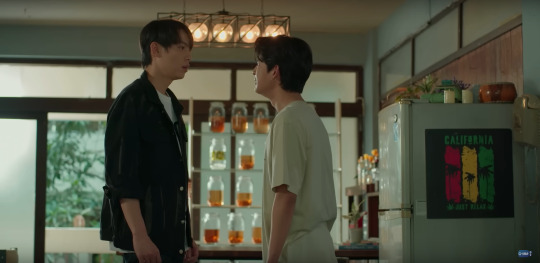
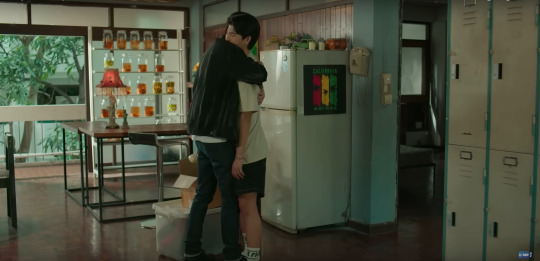
Because Sand is a caretaker, and caretakers, at least in my own experience, are used to having their own wants and needs trampled over. No boundary withstands first contact with someone in need of help. I have tried to reach out and give support to people that I know didn’t like me after they went through hard times together, I don’t talk to my friends about shit that is actually and actively impactful to my mental health and wellbeing, many of the people I am friends with frequently only reach out when they need something from me. If they needed homework answers, or if they needed observation, or if they needed to be picked up early in the morning from the airport and otherwise they never really talked to me. Like, I get a lot of where Sand is coming from with his need to take care of Ray because Ray is a young adult, going through a lot, in need of a lot of professional help he isn’t getting, and Sand can’t not be compelled to help him as much as he can.
And listen, in my opinion some of Sand’s actions with Ray are justified from a safety perspective, Sand is a caretaker, Sand knows Ray is willing to drink and drive, Sand puts his pride aside to try and ensure that Ray doesn’t leave in his car, and then follows him to make sure that he doesn’t get in to an accident. Those actions make sense to me.
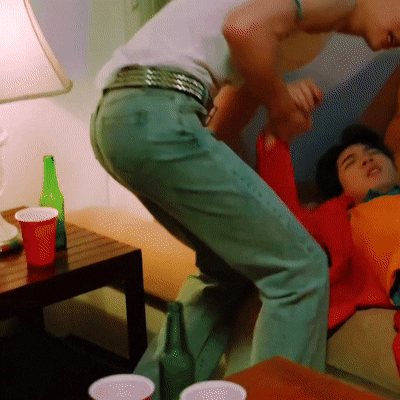
gif from @bird-inacage
Sand doesn’t want Ray to get in to any more legal trouble, so tries to hide the evidence of drugs and get Ray out of the party, which in a normal circumstance I would generally be in support of, but crucially, as @neuroticbookworm and @lurkingshan have touched on in some of their posts Sand cannot afford a run in with police. Not in the same way that Ray can. Ray is rich, Ray says he can handle the cops, and he can because he can buy them off, the way that Top bought them off. But Sand doesn’t come from a world where he can skirt consequences.
But there are many places where Sand lets himself get trampled over because he has legitimate feelings for Ray, and Ray won’t let Sand make his own choices long enough to wake up, look around, and realize that Ray has literally given him nothing of substance in return.
#only friends the series#ofts#only friends#only friends analysis#only friends meta#ofts meta#ofts analysis#sandray#sand x ray#firstkhao#gmmtv#jojo tichakorn#ninew pinya#first kanaphan#khaotung thanawat#wka long post
202 notes
·
View notes
Text
Part 10 Trolls Headcanons/ Theories/ Thoughts/ Ideas
This may be my last headcanons list, my friends. Will still do art and stuff but I am fresh outta ideas.
Part1 Part2 Part3 Part4 Part5 Part6 Part7 Part8 Part9
Enjoy 💕
Sub Tribes - KPop/Reggaeton/Yodelers/Chaz etc. there's not many of them around because they came from overseas.
King Peppy - Didn't tell Poppy about Viva because he was in the early stages of dementia. (Canon?) For a while he thought Poppy WAS Viva. By the time he realised his 'mistake', Poppy was already grown.
Vacay Island - the brothers sometimes help Bruce at his restaurant. They have name tags with funny 'work names'. Flood, Big Fish, Classy, and Big Brunch. Viva and Poppy have done the odd shift as well, as Pinky and Vista. 😝
Brozone - they became world famous, argued and left BEFORE the cage went around the Pop Troll Tree. (Canon?)
Brozone - there was a rumoured 'unfinished' Brozone song that was supposed to be released after that tour. John finally finishes it and the brothers offer to sing it for Poppy's bridal entrance song. Poppy immediately faints. In my head the song is 'Helpless When She Smiles' by The Backstreet Boys
Brozone - whatever the Trolls equivalent of the Superbowl is, I feel like Bruce and JD would be very into it. Jerseys and face paint and everything.
Bruce - cameras make him self-conscious. If he is in a group he can tolerate it but hates being the only one in the photo.
Bruce - has caught his kids trying to do the Brozone dance routines. He tries to stay out of it best he can and let them have their fun but then they ask him to teach them and doesn't he just melt.
Bruce - has a wedding ring but it is Vacationer sized. He keeps it in his hair mostly but will braid it into his hair like an accessory for special occasions.
Bruce - 100% certain Poppy and Branch's first born would be a boy. "We're a family of five brothers! It took Brandy and I thirteen tries to have a daughter. Trust me, I have no doubt your first egg will absolutely be a boy." *They have a girl* Bruce 😑
Floyd - can only sleep comfortably near an open window. Sometimes can only sleep sitting up.
Floyd - will randomly stare off into space or mutter to himself.
Floyd - *clears throat* I ship Floom! 💕🏳️🌈
Floyd - can't stick to new hobbies for very long, he hyperfixates for a week or two then gets bored. Macrame, candle making, soap making, jewelry making, photography are some examples.
Clay - his brothers collectively tried to convince him that he was the adopted brother.
Clay - is quite squeamish. The sight of vomit, open wounds and bodily fluids; Clay will absolutely pass out. Snotty babies make him very uncomfortable.
Clay - gets Viva to braid his hair out of his face only when something really serious is happening *cracks neck* "Viva?" "Yah?" "Braid me" "Yes, Sir." Shwoooop
Clay - Found out the Classical Trolls have a library larger the Pop Village. "Viva, they have a whole wing dedicated to tragedies! Tragedies, Viva!"
Clay - okay, so he and Viva have never been a couple, even if he ever considered it, their work came first and he didn't want to jeopardize what they had. Buuuuuuuttt the thought that another Troll could one day be Viva's person, that she would go to them instead of him for comfort or ideas or laughs or safety or hugs... it makes Clay feel... weird.
Clay - at some point is named some kinda Troll magazines most eligible bachelor. Bro was in a boyband, co-runs a society of survivors, runs a business, is close friends with royalty, has been knighted, has a license to practice accounting and was part of the only known Perfect Family Harmony. He's apparently a hot commodity now.
John Dory - takes night classes to finally get his highschool diploma. Is too embarrassed to tell anyone until he graduates.
John Dory - doesn't get sick often. But when he does, he keeps going to the point of exhaustion.
John Dory - has indeed crossed paths with Delta Dawn before. Both of them have very different versions of the story. "I serenaded her." "The fool was whining something from the inside of a jail cell."
John Dory - has been known to sleep with his eyes open. Freaks people out.
John Dory - will drink milk straight from the carton and put it back in the fridge.
John Dory - teaches Bruce's kids all the swear words and does in fact tell them his rendition of where eggs come from.
Viva - tries to hide sadder feelings from Poppy. Worried that Poppy won't want to hang out with her if she isn't fun.
Poppy - sometimes feels guilty, if things had been different, Viva would have been Queen. Viva tries to reassure Poppy that she is "The right Troll for the role." 👍🏻 Also Viva tries to argue that they both technically get be Queens now anyway.
Guy Diamond - Trolls have eggs when they have powerful feelings of love. Guy Diamond was able to have Tiny because he loves himself so much.
youtube
#trolls#dreamworks trolls#trolls band together#trolls brozone#trolls movie#trolls clay#trolls branch#trolls floyd#trolls 3#trolls bruce#trolls john dory#artists on tumblr#trolls headcanons#trolls guy diamond#trolls viva#trolls queen poppy#queen poppy#broppy#This may be my last headcanons list#So am trying to make it a good one#trolls cliva#cliva#brozone#viva trolls
90 notes
·
View notes
Text
pick a card– which book speaks to your soul?


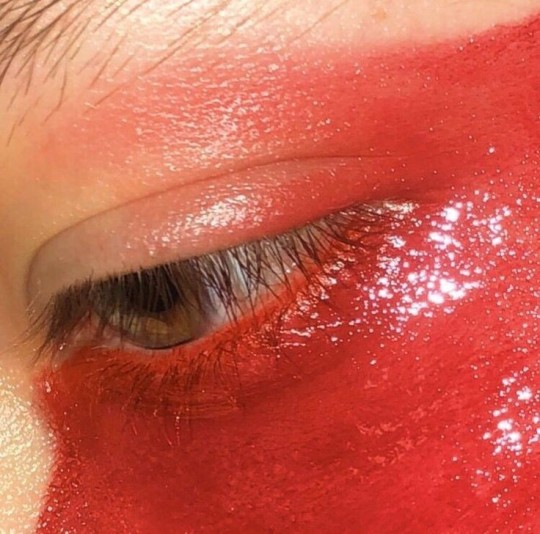
You read something which you thought only happened to you, and you discover that it happened 100 years ago to Dostoyevsky. This is a very great liberation for the suffering, struggling person, who always thinks that he is alone. This is why art is important.
—Conversations with James Baldwin.
this is my love letter to all the bookworms in the tarot community— pick a pile & i'll give you a list of genres + book suggestions carrying important messages to you.
I. THE FIRST

To the daydreamers and the escapists; to the ones that need to rest before following what you need follow.
RELEVANT GENRES & CONCEPTS– fiction in general; romance; fantasy; fairytale; poetry; ‘happy ever after’ endings; hopeful endings; fantasy; magic; dreamy.
AUTHORS – Ursula K. Le Guin; Louise Gluck; Mary Oliver; Jane Austen.
BOOKS FOR YOU–
‘The Paper Garden: An Artist Begins Her Life’s Work at 72 – Molly Peacock'
‘Good Bones – Maggie Smith’
‘If Not, Winter: Fragments of Sappho – Translation by Anne Carson’
‘Owls and Other Fantasies – Mary Oliver’
‘Dog Songs – Mary Oliver’
‘Emma – Jane Austen’
‘Howl’s Moving Castle – Diana Wynne Jones’
‘The Little Prince – Antoine de Saint-Exupéry’
‘Death Comes for the Archbishop – Willa Cather’
‘Sonnets from the Portuguese – Elizabeth Barrett Browning’
‘The Hawk and the Dove – Penelope Wilcock’
‘The Secret Life of the Lonely Doll: The Search for Dare Wright’
‘The Ink Dark Moon – Ono no Komachi & Izumi Shikibu’
‘Alice in Wonderland – Lewis Carroll’
‘The Letters of Vita Sackville-West and Virginia Woolf’
‘Little Women – Louisa May Alcott’
‘Anne of Green Gables – L.M. Montgomery’
‘Kissing the Witch: Old Tales in New Skins – Emma Donoghue’
II. THE SECOND

For the ones that carry the ache to learn and know everything; to the ones bored with life's commodities & seriousness. For the ones that question everything around them – as they should do.
You do not need to fit in. Don't change yourself for other people. If they want to see you this way, then become the proud witch in the edge of the woods.
RELEVANT GENRES & CONCEPTS– books on 'niche' knowledge; science; philosophy; true crime; drama; scandalous romances; adventure, magical realism; YA thriller & horror; comedy & sardonic comedy; ‘controversial’/'weird' books.
AUTHORS– Carmen Maria Machado, Kate Moore, Grady Hendrix.
BOOKS FOR YOU–
‘My Sister, The Serial Killer – Oyinkan Braithwaite'
‘The Man Who Mistook His Wife for a Hat and Other Clinical Tales – Oliver Sacks'
‘St. Lucy’s Home for Girls Raised by Wolves – Karen Russell'
‘Spook: Science Tackles the Afterlife – Mary Roach’
‘The Hitchhiker Guide to Galaxy – Douglas Adams'
‘Inferno – Dante Alighieri'
'Magic for Beginners – Kelly Link'
‘Lace Bone Beast: Poems & Other Fairytales for Wicked Girls – N.L. Shompole'
‘Severed: A History of Heads Lost and Heads Found – Frances Larson’
'The Woman They Could Not Silence – Kate Moore'
‘The Dictionary of Lost Words – Pip Williams'
‘She Kills Me: The True Stories of History’s Deadliest Women – Jennifer Wright’
‘Anatomy: A Love Story – Dana Schwartz'
‘Pretty Dead Queens – Alexa Donne'
‘I’m Glad My Mom Died – Jennette McCurdy'
'Rabid: A Cultural History of the World's Most Diabolical Virus – Bill Wasik'
‘Chilling Adventures of Sabrina – Roberto Aguirre-Sacasa’
III. THE THIRD

You need to put your sadness somewhere. If you can't, remember that someone has done it before – and transformed it into a story. Let the words you'll read be the resting place for whatever you're feeling right now; let yourself remember that not even your pain is lonely in this world.
RELEVANT GENRES AND CONCEPTS— poetry; gothic horror; thrillers; murder mysteries; tragedies; cathartic stories; biographies.
AUTHORS– Shirley Jackson, Osamu Dazai, Clarice Lispector, Sylvia Plath.
BOOKS FOR YOU—
'The Year of Magical Thinking – Joan Didion'
‘The Dead – James Joyce'
‘What The Living Do – Marie Howe'
‘The Hour of the Star – Clarice Lispector'
‘Why This World: A Biography of Clarice Lispector’
‘Some of Us Did Not Die – June Jordan'
Somewhere Towards the End – Diana Athill'
‘We Have Always Lived in The Castle – Shirley Jackson'
'Heaven: A Novel – Mieko Kawakami'
'Journal of a Solitude – May Sarton'
'Jane Eyre – Charlotte Bronte'
'Grief is the Thing with Feathers – Max Porter'
‘Carrie – Stephen King'
'Of Dogs and Walls – Yuko Tsushima'
'Frankenstein – Mary Shelley'
'The Stepping Off Place – Cameron Kelly'
'Letters to Milena – Franz Kafka'
‘Beloved – Toni Morrison'
#pac#pick a card#pick a card reading#pick a pile#pick a pile reading#pick a deck#tarot reading#tarot#tarot reader#cartomancy#divination#witchblr#witchcraft#witch#tarotblr#tarotdaily#intuitive#tarot community#tarot cards#tarotonline#free tarot readings
1K notes
·
View notes
Text
At times in the writing of wine history, wine itself has been treated as a historical actor. This is the case in many of the sweeping histories of wine, such as Hugh Johnson’s original Vintage: The Story of Wine, Paul Lukacs’s recent Inventing Wine, John Varriano’s Wine: A Cultural History, or Marc Millon’s Wine: A Global History. These lucid and entertaining histories, written by great narrators with serious wine expertise, follow a similar narrative arc. Wine is the central protagonist, the potable Zelig, popping up in different historical moments in different parts of the world. The story begins in the Fertile Crescent, where Wine is born, or in the ancient Mediterranean, where Wine enters a boisterous adolescence in the symposia and bacchanalia of the ancient Greeks. The reader is invited to pause and appreciate the wine-themed mosaic and shards of amphorae. The story then skips a few centuries and a few hundred miles, to medieval Europe (we are left to wonder what Wine has done in between), where Wine joins forces with powerful and institutionalized Christianity and canny monks create a patchwork of orderly clos on the Côte d’Or: bless them! Wine remains in France, or perhaps summers in Germany, and Bordeaux emerges in the seventeenth century, eventually finding its way to Britain (we are treated to a Samuel Johnson quote, or Pepys). Port and sherry have their seafaring adventures. The nineteenth century opens with Champagne surviving war, producing widows and conquering Russian markets; France produces Pasteur, who produces better wine, a triumph of science and the Enlightenment; wine is enjoying its golden years. Then, three-quarters of the way through this drama, tragedy strikes, in the form of the vine disease phylloxera. Wine is dealt a staggering blow and its very survival is threatened. Fortunately, a new world of scientists, mavericks, and neoliberal entrepreneurs emerge: capital is found, the plucky New World steps in to help, and new vines are grafted. Wine is saved! This cannot be criticized as being a Eurocentric narrative, because the tale concludes in California, or Uruguay, or China. Undeniably, at the conclusion of this story there is incredible momentum and optimism. Global wine production is the highest it has ever been, consumption of wine is high, and wine is (relatively) cheap. Were he a wine historian, Francis Fukuyama would declare it the end of wine history.
This hagiography of Wine is a great read: a mouth-watering tale of high drama, blind monks, and supple tannins. And it is not necessarily inaccurate. But it is, on the other hand, what British historians have called a Whiggish narrative: one that presumes continual progress, culminating in the current era, which is assumed to be the best ever. This Whiggishness may overlook some of the current difficulties in the market, or shrug off past problems in the wine industry, since all ended well. Geographically and chronologically it is uneven, such that the producers studied here generally do not merit inclusion until they have become major global actors. This type of narrative structure is what gives the false impression that South Africa produced a great wine called Constantia in the eighteenth century, and then produced nothing again until 1994. The place of Wine as the embattled protagonist who overcomes many hardships (vine diseases, consumer apathy, high taxation) and emerges triumphant and affordable in the late twentieth century, is also what is known in Marxist terms as “commodity fetishism.” As Bruce Robbins has argued, in the new commodity histories, “each commodity takes its turn as the star of capitalism.” The commodity itself, rather than the social and economic relationships that led to its production, becomes the driving force of the narrative.
Jennifer Regan-Lefebvre, Imperial Wine: How the Empire Made Wine's New World
45 notes
·
View notes
Text
Which characters have tragic pasts that aren’t recognized enough?
I think people don't notice because Petra is very active about her situation. She's a political hostage in a foreign land that has turned her country into a vassal state from the war that killed her dad. But she's made the most of it. Petra taught herself a new language, she trains constantly, she's made herself be involved with the politics of Fodlan, and she's always seeking to better herself and hone her skills so that she's not just a prisoner but someone useful to Brigid. Petra's the opposite of passive, she refuses to just let things happen to her, and in a lot of ways she doesn't have a choice either she is an active participant in her life or she will just be shuffled around as a political pawn and hostage against the country she loves. We don't know the specifics of the international agreement about Petra but I can easily imagine it being something like "give us a hostage as a guarantee you won't attack us or we'll continue the war we won, raze you to the ground, kill all of you, and take your land".
Claude's backstory isn't tragic and uh... at least half the cast if not more has had it worse than him but I do want to talk about it since I never see people talk about the struggles Claude has had. I think a large part of it is that like Petra, Claude doesn't show the struggles he's been through nor does he really talk about himself or his past. They both show a strong front and face forward in their lives.
Claude's spent his entire life being alienated, in Almyra for being too foreign and not Almyran enough and then in Fodlan for being too foreign and not Fodlan enough. He's faced multiple childhood assassination attempts just because of his parentage and at least some of these have come from family members. Claude is a rarity among the cast in having not only both parents but having 2 parents that love him. However his parents are of the tough love approach, that what doesn't kill will make him stronger so they offer him little support, protection, or help in a world that is hostile to him at every turn. And so Claude grew up with everyone against him, with his every action used as justification that he's weaker and lesser than a full Almyran. And this has destroyed his ability to trust or be open with people. Claude is very insecure in his interactions with other people because he's used to every slip of information given being used against him. You see this in his supports with Marianne where he sees any information about himself as possible leverage against him so it has to be exchanged like a commodity so that they both have equal leverage against the other. And yet he does genuinely want to help people and cares about those around him as clumsy as his attempts are at making friends. Claude's backstory is not nearly on the level of say Edelgard's or Lysithea's but it's a shame no one is talking about it at all.
Dimitri stans screaming and crying about poor Dimitri and yeah he's had it rough (a lot of 3H characters have traumatizing backstories) but Dedue is right there, what about his pain! The hypocrisy! The Tragedy of Duscar led to the massacre of his family and not only that but he's now a genocide survivor since Faerghus decided to wipe out Duscar, take over their land, rename and settle on it. Not to mention they were wrongfully scapegoated for it. Dedue has had everything taken from him so he doubles down on this life debt to Dimitri because it's the one thing he has left. It's a trauma response coping mechanism that he's rather override his will, opinions, and personhood for Dimitri's sake. And the of course Faerghus hates him and reminds him of that every day.
At this point I'm wondering if its a racism problem that it's Petra, Dedue, and Claude whose struggles are most often overlooked.
95 notes
·
View notes
Text
I'm trying to focus on what I liked about Episode 7 and my brain is just looping a few things.
-Was that Colonel Alkire at the camp heading up compound staff? I missed if he was named, but if so, I'm quite pleased to see him.
-Frank Murphy getting a letter from his mom ❤️
-The way the show approached the Great Escape. They managed to keep the focus entirely on the tragedy and incredulousness of the situation, and on how it could directly impact the American prisoners in the other compounds. It felt very balanced and very Great Escape in the context of MotA, not Great Escape eclipsing the show.
- MUSTANGS!!!!! MotA is a bomber-centric show and B-17s are incredible in how they can be beat to hell and keep flying, but fighter planes will always be my first love when it comes to WWII.
-Von Lindeiner's removal from his position as commodant being mentioned. He's someone I find very interesting, plus it's nice to have that hint of how there was a whole world of politics going on when it came to the running of the camps and the tension between the Luftwaffe and the Gestapo.
- I loved all the fountain pen shots we got to see this ep when folks were writing.
#gotta focus on the good#masters of the air#mota spoilers#MotA#MotA: Episode 7#ngl when they were saying who thier letters were from I pulled an Egan and said “his mom!!” when Frank was talking. i love Frank's mom#I say compound staff bc which compund? unclear. Some of the lads were in South and asked to move to Center#but then they were apparently in West at the time of the march so idk we're just winging it at this point#the p-51s could have had more/better screen time but the Tuskegee boys will be here soon hopefully#frank murphy#darr alkire#Friedrich Wilhelm von Lindeiner-Wildau#gonna leave out all the middle names bc holy hell would that be a long tag#stalag luft iii#hbo war#ken lemmons
20 notes
·
View notes
Text
Idk in my mind third life has like. Iliad vibes. There is war and there are people clinging to each other because these bonds were forged in war. Even the softest moments are tinged with blood and the tragedy is puppeted by some god that wants to see the altar covered in blood.
Last life is apocalypse vibes. Bonds are waiting to be broken, but they’re also waiting to be forged. There’s death on the horizon and a monster that used to be something like you, once, and there are traitors everywhere. And yet. And yet the people rebuild. And yet there are arguments about the silliest things, about what kind of stairs to have, and there is joy over being tricked into death particularly well, and there is forgiveness for those that have abandoned you. And there is survival.
Double life is a folk tale in action. There’s a witch in the woods and the next door neighbors seem to always be waiting for a chance to sow mischief, but you can’t confront their lies. The farmers have seen the unfathomable and brought it to the surface, a ship cuts through the countryside and a man keeps pets only he can see correctly. There’s death, but in the strange way of monster and wights dying for their own entertainment. Forgiveness is easily granted, but seldom genuine, and in the end, nobody can escape the ties that bind.
Limited life is still going on, but it gives me mafia vibes. Death is easy and cheap, time is precious and family is more so. Nobody can say their hands are clean of blood… except maybe Scott. Violence is orchestrated, alliances are tightly woven, and time is a commodity. Hours are lost and stolen and bargained with and it’s each family reaching to be the last once standing, the one that owns the city. Life is cheap, but nothing else is.
93 notes
·
View notes
Text
Legolas, after the battle at Helm’s Deep: If there is anything that this horrible tragedy can teach us, it's that an elf's life is a precious commodity. Just because we have great hair and stunning features, it doesn't mean that we too can't not die in a battle.
12 notes
·
View notes
Text
xina and miguel worms. their rift is such an understated tragedy in the narrative—in particular because it's such an uncannily true-to-life depiction of a a formerly-inseparable pair of friends (importantly, a boy and a girl) who are torn apart by the worst parts of patriarchal socialization (with the added dimension that they were two non-white kids finding kinship in one another).
xina always... glowed. was more headstrong, more well-liked, more self-assured, and i think, as a boy from an abusive background, miguel was dazzled by this bright spot of a girl. she looked out for him, encouraged him to stand up for himself—and for many, many years, miguel saw her as a source of comfort and safety.
and then they grow up. the institution they were raised in begins to tell him, a young man, that he is the smartest person in the room, and promise him a seat as a member of the ruling class.
miguel buys into the indoctrination. he has spent so much of his life feeling afraid. watching his father yell and spit and swing his fists. alchemax gives him a playbook on what he has to do to join this room of powerful white men. (the fact that tyler refuses to call him by his actual name is something he is willing to tolerate.)
xina's intelligence starts to bother him. miguel's admiration towards her, which has always, always existed, withers. she's now a threat to this new siren-song worldview that the man is the most important person in the room. she is not an extension of him. xina, who he has always loved and respected as a boy, threatens his status as a man.
(but here's the thing: miguel will never be anything but a commodity. alchemax will let him neglect his heritage and morality in the pursuit of whiteness and a faulty conceptualization of what it means to be a man—let him be "one of the good ones"—but as soon as he becomes inconvenient it becomes painfully obvious that he never mattered.)
(he always mattered to xina.)
xina doesn't know it yet, but her best friend is gone.
#SOS. this user found out about xinamig#xina kwan#miguel o'hara#xinamiguel#marvel comic blogging#i'll be honest i saw a cool comics character with a cantonese last name and immediately blacked out#in my rich inner world he becomes a xinahead once more when the snaps out of it#thirty years old and going xina is mad at me i hope i die and go to hell#these comics are exploding my brain
42 notes
·
View notes
Note
hey I’m obsessed with your hunger games posts (both the art and the written analysis)
i just reread the series for the first time since I was a teenager and i forgot how hard they slap. I love ur posts about gale (he’s just a mess bitch) (and by bitch i mean character) (but also I mean bitch)
I was wondering if u have any thoughts on finnick (or if u have any fanart of) he’s always been the character I relate to and find the most complex and interesting. i so desperately want to know ur take on the tragedy that is finnick odair. I’m also tempted to send u my own analysis on him but idk if it would be at all appreciated
So there's this kid, right. He's only 14, and already people can tell he's gonna be a looker. Rather than wait for him to get older and have more of a fighting chance, they send him into the annual death match then and there (side note, this is a weird choice for a career district, right? We can all agree that. It's weird.) He wins because he 1. knows he's hot and 2. knows how to use that.
He's smart, resourceful, and understands the value of sex appeal. At 14.
Two years on and he finds out that he's a little too good at the charming Victor act. He's forced into prostitution, not to save himself but the people he loves. (THG is all about self sacrifice, about what we do for others at risk of ourselves. It's the aspect of humanity that Snow exploits throughout the series.)
But he's a survivor. He takes a shitty situation and makes the best of it, building a business around pillow talk and turning himself into the most valuable commodity rumours can buy. He successfully mentors a Victor and falls in love with her knowing full well it puts him AND her in even more danger (sorry to keep harping on about this, but oh look how love is once again its own form of rebellion, gosh it's like it's a running theme or something)
And then he joins THE rebellion, knowing that it will put them all at risk but also realising that if not now, then never. He marries the love of his life, becomes the big brother to K+P (his relationship with them is so sweet I can't even), sheds the Capitol persona that's kept him alive for a decade, begins to heal from all the trauma...
...and dies. No fanfare, no heroic last stand. He dies fleeing for his life, torn apart by monsters, just one more death in a sequence already filled with casualties. Blink and you'll miss it. It almost feels meaningless, and unfortunately that's the point – people die whether we want them to or not. It's devastating, but then so is war.
Finnick is a man built on contradictions. He acts like a playboy but is devoted to one person. He seems arrogant and self absorbed but will do anything to protect those he cares about. He's a main character but he dies like an extra.
And I'm still not over it.
(op thank you I'm amazed anyone's interested in my ramblings, and also absolutely send me your thoughts, I'd love to hear them!)
#the hunger games#finnick odair#annie cresta#odesta#finnick deserved better#and that's exactly why he had to die#i hate it#this isn't analysis so much as me crying on my keyboard#also if haymitch is katniss down the line#finnick is peeta#also also i think finnick is the reason annie won her games#it's a little TOO convenient that after her meltdown the arena floods and she's the only decent swimmer left#like who did he sleep with to make that happen#rambles
111 notes
·
View notes
Text
We need to talk about Titus
Out of all the discussions around the Hunger Games, the one discussion I have yet to see is one around the past Tribute and "cannibal", Titus.
It strikes me as an extremely odd detail to be randomly thrown in, not only being one of the only past non-victor tributes to have a name, (and the only one that isn't from the 10th and 74th games or Maysilee Donner, who has further significance to the plot) but also having such a wild story. Titus being relegated to a one-off line is extremely confusing to me.
But what's more confusing is how he's treated, both in-universe by other tributes, and irl by readers/fans. And I think Capitol Propaganda has a lot to do with it.
The little we do know about Titus is:
He was from District 6
He was anywhere from 12-18 years old
He was killed by an *avalanche*
He was "crazy" and snapped during the games
He cannibalized the hearts of the tributes he killed
Right away, this tells me that there's more to Titus than just having lost it, or even being mentally ill prior to the games, though that may have had a part. However, it's definitely not the main factor at play.
Firstly, we need to look at how the Capitol treats these literal children in the short time that they're being prepared to fight to the death. They're almost constantly in the public eye, pushed to train, and treated like commodities for the residents of the Capitol. Residents who live in opulence, compared to the poverty and struggles of the rest of the districts. District 6 especially, where Titus is from, seems to have had a rough time, what with an implied morphling problem and their focus being Transport, meaning that their tributes have absolutely no prior skills that would be useful in the games.
Combining all of these factors, and we don't have to make a leap to assume that Titus would already be under a lot of stress from the get-go.
Then, consider the Arena. This is where the avalanche comes into play. An avalanche would mean snow, which would mean that the arena was likely some sort of tundra, or at least was winter-like. From other games, it has been shown that the gamemakers will purposely make it difficult for tributes to access basic resources like water or food. If Titus had been unlucky at the cornucopia, he would be hard-pressed to find food in a snow-covered environment.
And these two factors, stress and hunger, make it pretty clear to me why Titus did what he did, and why that's so important to the rest of the story as a whole.
Titus. Was. Starving.
Desperation for food, stress from what he'd already gone through, and the fact that Titus was a child makes it pretty clear that if he "snapped", it wasn't because he was insane, it was because of the Capitol.
And the tragedy of this is that the Capitol pushed this boy to desperation, and because he lashed out at them for it (and they found his actions in desperation "unsightly"), they tazed him, they killed him, and they framed the entire situation as this "monstrous crazy person gone rogue".
The Capitol once again kept the people blind to their cruelty, but this time, they even did so to us, the reader.
#the hunger games#thg meta#thg#titus the hunger games#thg titus#hunger games#hunger games meta#hunger games discussion#tw: cannibalism#tw: violence
257 notes
·
View notes
Photo


Tragedy turned Commodity
98 notes
·
View notes
Text

https://www.tumblr.com/manslaughter/718892034407219200
tumblr users who are otherwise good about being skeptical that the utterly defenseless and voiceless would be effectively protected by the systems we have in place want so badly to believe that animal abuse simply does not happen, and if it does it gets caught right away, and that laws and regulations around it both qualify things we would find horrific as "abuse" and are reliably enforced and everything is just completely fine and good, they will fully and uncritically believe that the very first person who confidently says what they want to hear is surely honest and unbiased and has a complete and representative picture of the global situation
like. I'm not claiming to have done extensive research in this area. But I didn't have to do very much to find very recent stories of the horrific conditions animals used for testing have been found to be in. using sentient creatures as commodities is just always going to be rife with abuse-- is inherently abusive and should be treated like the tragedy it is, one to be minimized wherever possible and hopefully, someday, with enough progress, avoided entirely.
just like, god, remembering dairyisntscary and the way everyone on this website sucked them off every time they posted about how cows in the dairy industry are all healthy and happy and treated wonderfully and I mean really we're doing them a favor and it's just great all the time, pay no attention to the actual industry-standard practices and all the laws preventing activists from recording video footage of factory farms, I'm sure that doesn't mean anything, it's fine
#this one's actually pretty recent#squirmy#that post about how bees are unionized#and those posts about how sheep *need* to be sheared#also fit into this pattern#abuse is actually very very very very profitable and easy! there is a reason we consistently need laws to stop it!
27 notes
·
View notes
Text
Exploring the Darker Themes in Jujutsu Kaisen and Their Narrative Importance
CW: Incest and Misogyny

Jujutsu Kaisen is a series coated in horror imagery and it has never shied away from exploring dark and taboo subject matter. Two recurring themes in this series are incest and the treatment of women
Incest is prevalent in Jujutsu Society, particularly for the Nobles, where it seems to be more or less normalized. Naoya openly talks about viewing both Maki and Mai as "attractive and buxom," and we even have an interview from Gege, where he expressed that Mai's first crush was either Megumi or Maki.

It isn't uncommon amongst nobility to prioritize "blood purity" by marrying within the family, but it makes sense for this idea to be so prevalent amongst Jujutsu Sorcerers who are obsessed with passing on inherited Techniques.
Outside of nobility, we see this same scenario play out with Mei Mei and Ui Ui. Their relationship is never commented on by outsiders, suggesting it's viewed at least partly as normal in that society
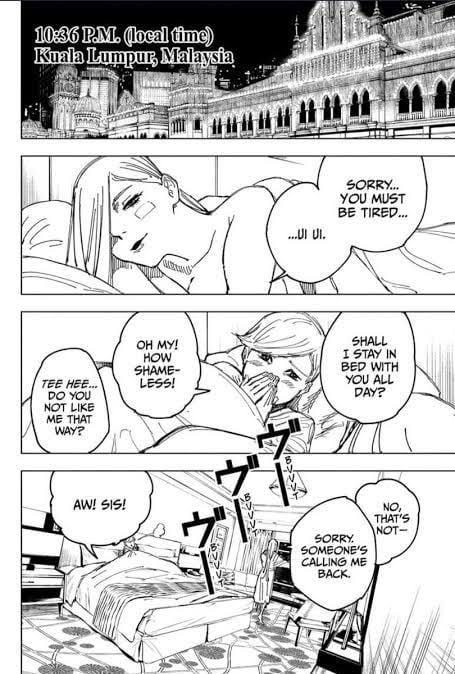
But Gege doesn't just put these scenes in for shock value, they serve a purpose. Jujutsu Kaisen, despite being a Shounen, is a mature story. Dark material is often used to inform the reader about the deeper meaning behind the characters and the world. It's meant to make you think.
Jujutsu Society is corrupt and decadent, controlled by out-of-touch and regressive elders who care more about power and status than anything else. The structure is flawed, as we see addressed through characters like Gojo, Nanami, and Geto respectively.
We see this even further in how Jujutsu Society treats women.
Momo summed it up perfectly in her speech to Nobara. Women are not allotted the same luxuries as men. In order to be taken seriously as a Sorcerer, they have to be perfect. They need to be both beautiful and powerful.
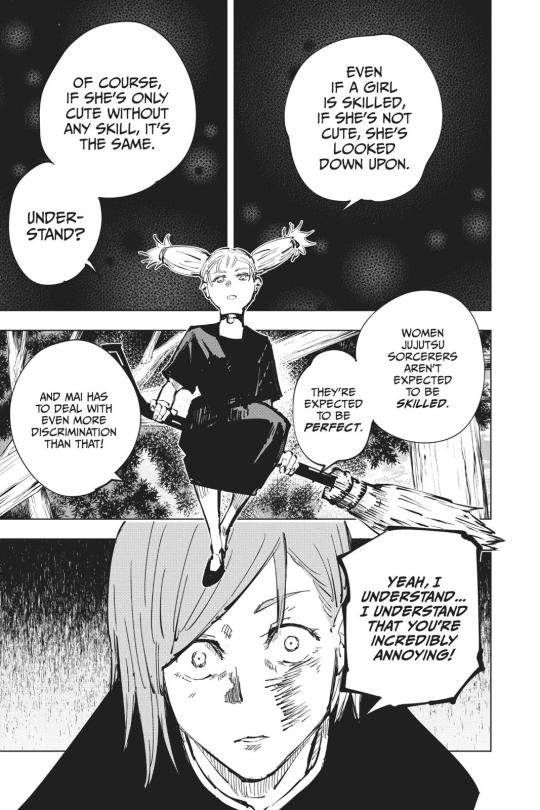

This trend is only further explored through the lens of the Noble Houses. The Zen'in actively look down on women and see them as lesser to men, a belief Naoya often espouses. Meanwhile, the Kamo had no issue with using Noritoshi's mom as a concubine, using her solely for her womb to birth an heir before kicking her out.
Women are seen as exploitable commodities and have to work twice as hard in Jujutsu Society to earn respect. Kenjaku, as Noritoshi Kamo, exploited a scared young woman for her Technique, using her to satisfy his own curiosity so he could make the Death Wombs. Even when he was found out, the concern was placed more on the scandal of the Cursed Items that were made rather than the treatment of the mother.
He later went on to violate the body of Kaori Itadori, using her womb as his own for the sole purpose of birthing a perfect vessel for Sukuna.
Uro Takoko, a Heian Era Shaman who managed to earn the esteemed title of the Head of the Sun, Moon, and Stars unit of assassins for the Toh, a Noble Clan who essentially controlled all of Japan back in the day, took the fall for a crime she didn't commit and was tossed aside.
Tengen, despite being a woman herself, has young women sacrifice themselves in order to merge with her and reverse her evolution, essentially disregarding their autonomy and using them as a tool. Riko herself was treated as less than human for her title as a Star Plasma Vessel, her death being treated as more of an inconvenience than a tragedy.
Both of these aspects tell the reader about the true state of Jujutsu Society and just how rotten to the core it truly is. It's uncomfortable, but it's meant to be. Corruption that runs this deep is meant to unsettle and disturb.
However, as dark as this series can be, there is always hope. Part of the beauty and maturity of Gege's writing is how he acknowledges both sides of humanity, the good and the bad.
Yūji and Sukuna's struggle in the most recent chapters illustrate that despite the pain of living, humans still fight for happiness in a world that's often set on taking it away.
Toji, despite being an assassin who murdered a teenage girl in cold blood, also gave up his son to a family he personally hated in hopes that he would have a better chance at life there than with him.
Geto was driven mad by the very same system that exploited people like him. For all the pain he caused, he wished for a world where Shaman wouldn't have to fight and die for an oppressive majority. He wished for freedom and safety for his people.
Even villains like Sukuna and Kenjaku have their moments of humanity. Where Gojo chided Jogo for being weak, Sukuna earnestly praised his strength in battle.

Kenjaku praises both Mai and Miwa for their skills, two women who were seen as lesser by the community they live in. He also praises Yuki's talent and genuinely thanks Sasaki for being nice to his son

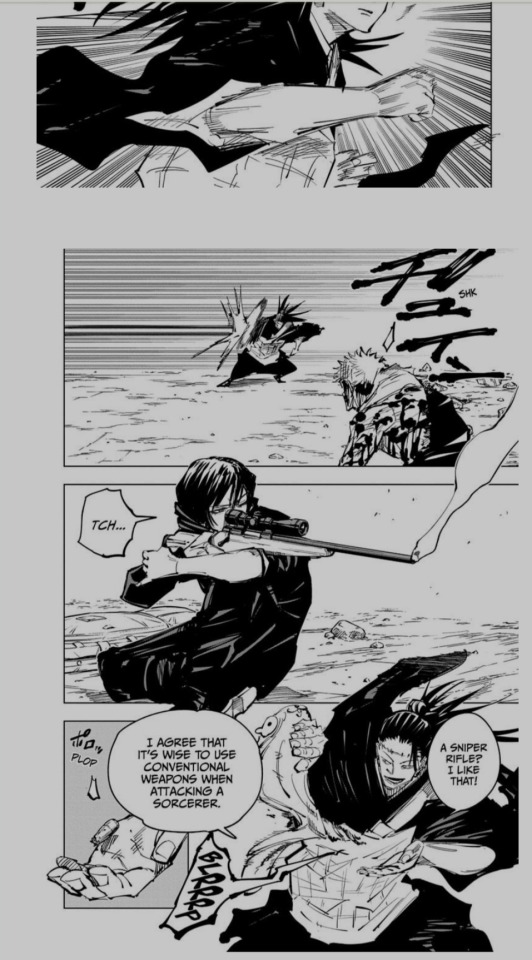
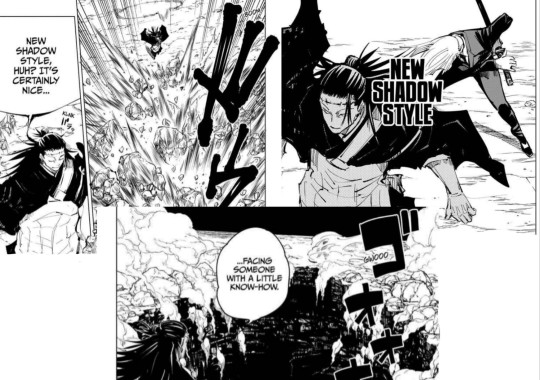
Elements of darkness can bring depth to stories, and shying away from it is to ignore a core part of humanity as a whole. You can't fully appreciate the light without first accepting the dark.

48 notes
·
View notes